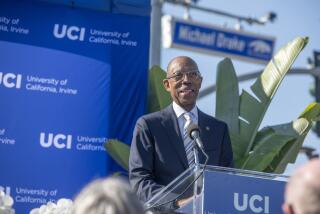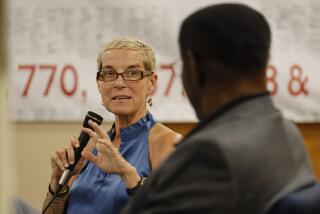Martin Trow, 80; studied transformation of universities
- Share via
Martin Trow, a longtime UC Berkeley professor who wrote an influential 1973 study on the changing nature of American higher education from an elite enterprise to one serving the masses, has died. He was 80.
Trow had an inoperable brain tumor and died Feb. 24 at his Berkeley home, a university representative said.
During four decades at UC Berkeley, Trow was regarded as a leading member of a small but distinguished group of higher education scholars. He wrote widely about colleges and universities in the United States and other countries, particularly Britain, Sweden and Japan. He was frequently consulted on such critical matters as university governance, faculty recruitment and student culture, and was a prominent critic of affirmative action.
“He was one of the top five” experts in the field of higher education scholarship, said former University of California President David P. Gardner, who knew Trow for more than 40 years and often sought his advice on sensitive issues. “He was always a reliable and forthright advisor to whom I could turn for counsel ... and I would be getting it straight, not colored in any way because of our friendship.”
Trow’s 1973 study, written for the Organization for Economic Cooperation and Development, described the expansion of higher education in the United States, which shot far ahead of other countries in providing broad access to colleges and universities as the GI Bill sent thousands of World War II veterans back to school.
“It struck a chord with many countries wanting to know where they were on this trend line. Even today, there are countries that wonder about it,” said Burton Clark, a UCLA professor emeritus of higher education, who along with Trow is considered one of the doyens of higher education research.
As Trow noted in the study, however, the trend was not entirely positive.
“The growth of enrollments and the movement toward universal higher education has made enrollment in college increasingly obligatory for many students and their presence there increasingly involuntary,” he wrote.
“In this respect colleges begin to resemble elementary and secondary schools, where it has long been recognized that compulsory attendance increases problems of student motivation, boredom, and the maintenance of order.”
In 1970, when students against the Vietnam War marched and rioted in Isla Vista, an unincorporated community in Santa Barbara County next to the UC Santa Barbara campus, Trow was enlisted by then-UC President Charles J. Hitch to study the causes of the disturbances, in which a student died, many others were hurt and a Bank of America branch was burned.
The task force Trow directed identified the key problems as the overdevelopment of Isla Vista -- a virtual youth ghetto with crowded, dilapidated housing and poor or nonexistent public services -- and the hands-off attitude of campus administrators toward its deterioration.
“He offered very constructive suggestions,” said Gardner, who was then an assistant chancellor at the campus, “and UCSB took them.”
Trow was known for his analyses of student culture, particularly in essays published in 1966 and 1972 that he wrote with Clark. Neil Smelser, a UC Berkeley emeritus professor of sociology, called their essays “a landmark contribution to the understanding of student life.”
He also directed huge surveys of American undergraduates for the Carnegie Commission in the 1970s when it was headed by Clark Kerr, the former UC president. The surveys found that despite the turmoil on many of the nation’s campuses and complaints that college courses lacked contemporary relevance, most students were satisfied with their undergraduate experience.
Trow was born in New York City on June 21, 1926. He earned a bachelor’s degree in mechanical engineering from the Stevens Institute of Technology in New Jersey in 1947 after serving in the U.S. Navy during World War II. He worked for a few years as an engineer before shifting his focus to sociology and earned a doctorate in the field at Columbia University in 1956.
He was co-author, with eminent sociologists Seymour Martin Lipset and James Coleman, of “ Union Democracy,” a classic case study of a printers union published in 1956.
He taught at Bennington College in Vermont before joining the UC Berkeley faculty in 1957. That year, the campus launched the Center for Studies in Higher Education, the first such academic research institute in the nation; Trow was director from 1976 to 1988. A leading faculty voice, he also headed the UC systemwide Academic Senate from 1991 to 1992. He took emeritus status in 1993.
Trow is survived by his wife of 47 years, Katherine Bernhardi Trow of Berkeley; a daughter, Sarah Eydam of Antioch, Calif.; sons Paul of Natick, Mass., and Peter of Santa Barbara; and a grandson.
More to Read
Sign up for Essential California
The most important California stories and recommendations in your inbox every morning.
You may occasionally receive promotional content from the Los Angeles Times.











